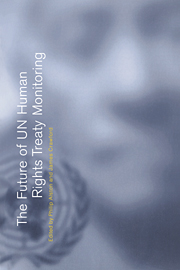Book contents
- Frontmatter
- Contents
- List of Tables, Figure, Appendices
- Notes on Contributors
- Editors' Preface
- Table of Treaties
- Table of Cases
- List of Abbreviations
- 1 The UN human rights treaty system: A system in crisis?
- A The UN human rights monitoring system in action
- 2 Individual claims in a world of massive violations: What role for the Human Rights Committee?
- 3 Decision-taking in the Committee on the Elimination of Racial Discrimination
- 4 The Committee on the Elimination of Discrimination against Women at the crossroads
- 5 The reporting process under the Convention on the Rights of the Child
- 6 The Committee on Economic, Social and Cultural Rights: Catalyst for change in a system needing reform
- 7 Country-oriented procedures under the Convention against Torture: Towards a new dynamism
- 8 UN human rights reporting procedures: An NGO perspective
- B National influences and responses
- C Regional and sectoral comparisons
- D Common challenges for the treaty bodies
- E Looking to the future
- Index
2 - Individual claims in a world of massive violations: What role for the Human Rights Committee?
Published online by Cambridge University Press: 23 December 2009
- Frontmatter
- Contents
- List of Tables, Figure, Appendices
- Notes on Contributors
- Editors' Preface
- Table of Treaties
- Table of Cases
- List of Abbreviations
- 1 The UN human rights treaty system: A system in crisis?
- A The UN human rights monitoring system in action
- 2 Individual claims in a world of massive violations: What role for the Human Rights Committee?
- 3 Decision-taking in the Committee on the Elimination of Racial Discrimination
- 4 The Committee on the Elimination of Discrimination against Women at the crossroads
- 5 The reporting process under the Convention on the Rights of the Child
- 6 The Committee on Economic, Social and Cultural Rights: Catalyst for change in a system needing reform
- 7 Country-oriented procedures under the Convention against Torture: Towards a new dynamism
- 8 UN human rights reporting procedures: An NGO perspective
- B National influences and responses
- C Regional and sectoral comparisons
- D Common challenges for the treaty bodies
- E Looking to the future
- Index
Summary
Introduction
SETTING OUT THE PROBLEM
Individual claims against a state before a permanent international organ (committee, commission, tribunal, court) no longer stand out as stark exceptions to the usual patterns of international law, as anomalies that we struggle to fit within an established or even necessary order. The earlier questions – How can we understand this phenomenon within a system of state-to-state relations? How can it be reconciled with rooted premises of international law like state sovereignty? – have lost their salience as such claims have become more familiar, and as the premises have changed. An evolving theory and practice expressing different understandings of international law and relations readily make place for the individual, together with many types of non-state institutions, as essential actors and participants.
Individual claims are not yet commonplace, but neither are they rare. Undoubtedly the growth of the human rights movement over the last fifty years has had much to do with this changed incidence and perception. That movement – by which this chapter refers to governmental and intergovernmental as well as non-governmental developments in human rights since 1945 – has taken a vital step beyond the historical analogies by authorising claims by individuals against the very state of their nationality. Several universal human rights treaties empower an individual to initiate against the state some kind of process before a treaty organ that allows for the consideration and disposition of a claim of violation of a right declared in the treaty.
- Type
- Chapter
- Information
- The Future of UN Human Rights Treaty Monitoring , pp. 15 - 54Publisher: Cambridge University PressPrint publication year: 2000
- 30
- Cited by



